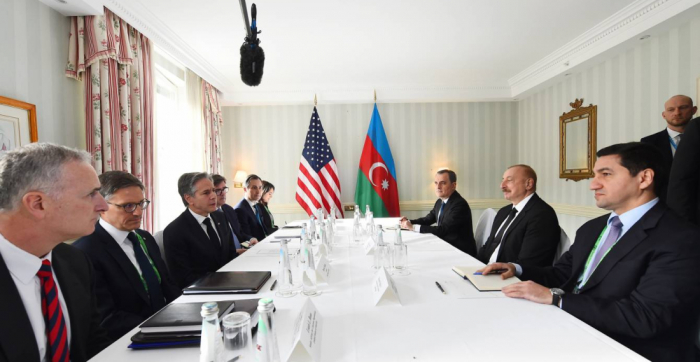Over the past two years, since the beginning of the Russia-Ukraine conflict, Azerbaijan’s foreign and security policies have drawn varying interpretations from experts and political observers.
The delicate balancing act pursued by Baku between competing global powers while safeguarding the country’s national interests and restoring its territorial integrity has appeared as an intriguing case for the studies of international relations. Many experts are still debating how the Azerbaijani government succeeded to dismantle the separatist regime in Karabakh without provoking a clash with Russia, widely known to be the major protector of this regime. In November 2023, during an international conference in a European city attended by the author of this article, Armenian experts critiqued the collaboration between Azerbaijan and the Western powers (i.e., the EU and United States) in September 2023 to dismantle to the separatist regime, aiming to diminish Russia's influence in the South Caucasus. Interestingly, some of these experts now suggest that Baku has aligned with Moscow to penalize Armenia’s pro-Western government. This situation underscores the complexity of Azerbaijan's foreign policy, often susceptible to misinterpretation. Azerbaijan’s active participation at the Munich Security Conference (MSC) on February 16-18, and the meetings President Ilham Aliyev held with the representatives of the Western countries and institutions, underscores Baku’s continued commitment to its multilateral foreign policy and the importance it attaches to the relations with the West.
Three meetings held by President Aliyev on the sidelines of this conference were of particular importance for Azerbaijan and its relations with the West. First and foremost, it has been critically important that the leaders of Armenia and Azerbaijan came together for the first time since the September hostilities thanks to the support of the German Chancellor Olaf Scholz. This meeting took place against the backdrop of recent border clashes between Armenia and Azerbaijan and the latter’s growing disappointment with the monitoring mission of the EU on the Armenian side of the border. Baku’s primary concern is related to the fact that this mission is abused as a propaganda tool against Azerbaijan, in particular, to support the ungrounded claims that Azerbaijan is preparing an attack against Armenia. The meeting was a good opportunity for President Aliyev to communicate these messages to Chancellor Scholz.
The trilateral meeting with the participation of Scholz and a separate bilateral meeting of Aliyev and Pashinyan have been also very important to subdue the recent tensions between the two South Caucasian republics and revitalize the peace momentum. The positive messages given by the sides following the meeting offer a glimmer of hope that the remaining disputes on the path to a peace treaty can be diplomatically resolved. It was reported that the two countries agreed to continue meetings at different levels to address the remaining disputes. The Azerbaijani side reported that a peace treaty is very realistic. However, the conclusion of this process may take some more time as previously President Aliyev stated that Baku is not planning to sign a peace treaty unless Armenia removes territorial claims against Azerbaijan from its constitution.
Two additional meetings of President Aliyev – with United States Secretary of State Antony Blinken and Ukrainian President Volodymyr Zelensky, were also significant against the backdrop of the region's geopolitical dynamics. Both sides made positive statements following the Blinken-Aliyev meeting, contributing to the restoration of a constructive atmosphere in bilateral relations, particularly given recent tensions. Reports indicated that both sides expressed readiness and interest in enhancing bilateral ties, which have been pivotal for both nations over the past three decades. Azerbaijan's contributions to global anti-terrorism efforts, European energy security, and the promotion of connectivity projects linking Asia and Europe underscore its value as a strategic partner for the United States. In a similar vein, the United States has been a critical partner for Azerbaijan to safeguard its independence and build counterbalance against regional power centers.
President Aliyev’s meeting with his Ukrainian counterpart drew particular media attention. The Ukrainian media reported that President Aliyev once again expressed the support of his country to Ukraine’s efforts to protect its territorial integrity. “Our support for Ukraine’s territorial sovereignty and integrity is unshakable and will not change. We, as a country that suffered from occupation, understand your situation perfectly and wish peace to Ukrainians and Ukraine,” said Aliyev according to the media reports.
In spite of objections and occasional threats from the Russian side, Baku has been providing assistance to Ukraine as the country deals with the consequences of the war. The humanitarian support provided by Azerbaijan included, amongst others, free of charge fuel at Azerbaijan’s national oil company SOCAR’s petrol-filling stations across Ukraine and energy equipment, including transformators. According to the Ukrainian Ministry of Energy, since March 2022, Ukraine has received 92 cargoes of energy equipment from Azerbaijan with a total weight of more than 1,585 tons, including 51 power transformers, 111 transformer substations and other equipment. “We thank our [Azerbaijani] partners for this support. The provided equipment is used by Ukrainian energy workers to restore facilities that are still being shelled, in particular in front-line regions. The work carried out allows us to maintain stable operation of the energy system and meet the needs of consumers for electricity and heat supply,” said Ukrainian Energy Minister Herman Halushchenko, on the occasion of the arrival of a convoy of 25 trucks with another batch of electrical equipment to Ukraine from Azerbaijan on January 11, 2024.
In summary, amidst the evolving dynamics of regional geopolitics, Azerbaijan’s recent engagements with Western counterparts underscore its unwavering commitment to maintaining robust relations with the West. Despite the complexities of navigating relations with neighboring powers, Azerbaijan remains steadfast in its pursuit of multilateral or, as better known in the Azerbaijani discourse, balanced approach in foreign policy.
AzVision.az
More about:
















































